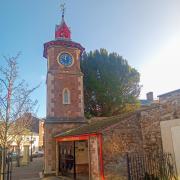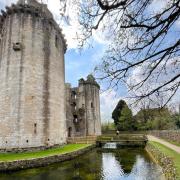As spring firmly takes hold, it’s the perfect time to venture out of hibernation and see Bristol’s gardens in full bloom. Here’s our pick of the city’s best gardens including a vast estate in rolling countryside, an intricate Tudor-style knot garden, an urban nature reserve and a Victorian garden cemetery.

University of Bristol Botanical Gardens
This botanic garden in Stoke Bishop tends to fly under the radar, and is often overlooked by locals. Within the five-acre site, there are four core plant collections, inviting visitors to stroll through several distinctly different worlds. Wander through prehistoric flora in Evolution to tropical vegetation and vibrant displays in the Mediterranean Climate Regions section, to a recognisable English country garden mix. Learn up on medicinal plants, marvel at verdant glass houses teeming with exotic species and discover an African Rondavel. The garden hosts a variety of events during the year, plus a diverse programme of gardening courses for the keen green-fingered. botanic-garden.bristol.ac.uk

Ashton Court Estate
A short hop across Clifton Suspension Bridge and you’re in Ashton Court’s whopping 800 acres of parkland. It’s a favourite with mountain bikers, horse riders, golfers, dog walkers and families, who flock here for countryside ventures close to the city (whose rainbow-coloured houses can be seen in the distance). At the heart of the woodland, deer park and green grassy areas, lies a 16th century manor house surrounded by formal sunken gardens, and a pond, with flower-filled borders and 160 species of rose. Tree lovers rejoice! The estate is home to a large number of unusual tree species, including gargantuan redwoods and a 700-year-old Domesday Oak. bristol.gov.uk/page/leisure-and-culture/ashton-court-estate

Brandon Hill
When Brandon Hill Nature Reserve was opened by Sir David Attenborough back in the 1980s, it was a pioneering testament to urban conservation, and remains a haven for wildlife to this day. In spring, the meadow glows with cowslips, while summer introduces the likes of daisies and knapweed. Located just off Bristol’s steep Park Street and framed by handsome Georgian houses, views soar over rooftops and boat masts to the distant Mendip hills. The century-old Cabot Tower, surrounded by a pretty water garden, stands as the best vantage point in the sloping Brandon Hill park. Accessible via steep, winding steps to the top, those that dare make the climb will be treated to phenomenal views in every direction. avonwildlifetrust.org.uk/nature-reserves/brandon-hill
Arnos Vale Cemetery
Established in 1839, this Victorian garden cemetery, set among 45 acres of woodland, was Bristol General Cemetery Company’s solution to overcrowded, unhygienic 19th century parish graveyards. On a hillside surrounded by fields, a scenic, nature-filled environment was created, with, as was fashionable at the time, architecture mirroring classical Greece. The growing city has since replaced those fields, making Arnos Vale a peaceful sanctuary in a bustling urban environment. Winding paths lead visitors through towering evergreens and tranquil woodland, grassland dotted with wildflowers, and a community garden. Pick up or download the Discovery Trail or Woodland Walk map, keeping an eye out for fairy doors, wildlife and monuments honouring notable former Bristol residents. arnosvale.org.uk

Royal Fort Gardens
Originally designed by English landscape architect Humphry Repton in 1800 (who also has Ashton Court gardens in his portfolio), the sloping green lawns belong to the University of Bristol, but are open to the public for most of the year. Last year, the gardens were bestowed with a coveted Green Flag Award and are the perfect spot for hill-rolling and picnicking. Visitors are encouraged to explore - seek out a wildflower garden and public artworks; dart in and out of Jeppe Hein’s mirrored labyrinth (a favourite with kids) and be wowed by ‘modernist grotto’, Hollow, created using 10,000 tree samples from across the globe by Katie Paterson and architects Zeller & Moye. bristol.ac.uk/external-estate/historicgardens/royalfort/
The Red Lodge
Behind an unassuming red door on Park Row lies a 16th century house with a captivating history and an Elizabethan-style knot garden. Following a restoration in the eighties, the garden was redesigned to showcase how it might have looked when the house was built over 400 years ago, drawing inspiration from plasterwork designs in the master bedroom, one of Bristol’s oldest rooms. Brimming with plants reminiscent of English gardens before 1630, the borders complement the Tudor knot garden trend. Red Lodge is open to the public from April until mid-December, although the garden is at its best in late May/June when the roses are in bloom. bristolmuseums.org.uk/red-lodge-museum
National Trust Tyntesfield
Just seven miles from Bristol, the National Trust’s Victorian Gothic Revival mansion house is surrounded by a sprawling 540 acres of picturesque parkland, woodland and gardens. The driveway, flanked by topiary yews gives you a glimpse of the horticultural delights that await, largely unchanged since the early 1900s. Large open lawns sit alongside formal terraces that burst with colourful bulbs in spring, while a rose garden with Mendip views and two restored Victorian gazebos is a treat for the senses, with over 100 highly-fragrant roses. There’s also an arboretum showcasing numerous Champion Trees, an Orangery, a cut-flower garden and an impressive Kitchen Garden whose produce supplies the Cow Barn restaurant onsite. nationaltrust.org.uk



























